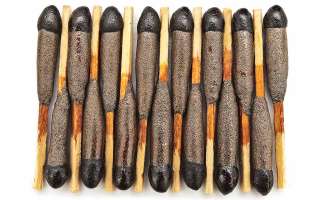We use the ‘Flesch–Kincaid Grade Level Formula’ to present scores as per US grade level. See all the grade levels here. Following articles, stories and features are appropriate for people at reading level of Grade 8 (Age 13-14 years). More information about Flesch–Kincaid readability tests can be found here.
257 items in this section. Displaying page 5 of 26
The Birth of Christ
Christmas celebrates the birth of Jesus Christ. Everyone knows that. Do you know the entire story of his birth? Let me narrate it in brief. Over 2000 ago, Roman emperor Caesar Augustus, issued a decree that a census should be taken of the entire Roman world. So everyone went to his or her hometowns to register. A carpenter called Joseph, who was in Nazareth in Galilee in the Middle East (which was also part of the empire), went to nearby Bethlehem....
Welcome to Blind Cow Restaurant
Almost two years ago, a blind pastor, Reverend Jorge Spielmann started a restaurant for the blind in the city of Zurich, in Switzerland. Almost all the chefs, bartenders and waitresses who worked at the Blind Cow, as the restaurant was named, were also blind. Now, not just the blind, but even people who can see with their eyes flock to this restaurant for the unique experience it provides, apart from the good fare it dishes out....
Do Whales and Dolphins see Blue?
Dolphins and whales live in the deep blue sea, but strangely these animals are not able to see the colour blue! Leo Peichl of the Max Planck Institute for Brain Research in Frankfurt and his colleagues discovered during routine tests that seals do not respond to the blue colour. Intrigued, they carried out similar tests on few other species, such as dolphins and whales, and found the same results. According to fossil evidence, whales are believed to have descended from a four-legged primitive ungulate (hoofed mammal) which lived on land and was similar to the modern day hippopotamus....
Who Invented Band-aid?
What happens when you have a small wound? Just apply a small piece of sticky plaster with gauze (a loosely-woven cotton surgical dressing), or band-aid on it for a few days, and ta-da, your wound is healed! What a stupendous item this band-aid is! So ideal for accident prone people, whether adults or kids. Well it was exactly for this reason that Earle Dickson invented it. He did it for his wife, who though not into rough contact sports was nevertheless accident prone....
How did the Safety Match Originate?
Fire was invented when two flint stones were struck together igniting a spark. From earliest times people made fire by either striking flint stones or by rubbing a hard stick against a soft one so that the friction caused soft flakes to peel off and start to smoulder. The only improvement on these primitive methods was the tinder box that contained some steel, flint, and some dry tinder for the spark to ignite. This tinder was often pieces of linen or silk....
Iftar: The Meal that Breaks the Fast at Ramadan
It is the month of Ramadan (Ramzan) in the Islamic calendar and, for those who believe in it, each day of the month follows an identical routine: a fast from sunrise to sunset. At sundown, after a whole day of not eating or even taking a sip of water, the fast is broken. It is the time when the family gets together and eats a light but energy-giving healthy meal. This is Iftar, or the meal that breaks the fast....
Which is the World's Oldest Working Locomotive?
The Indian Railways is one of the world’s oldest railways dating back to 1849. It also has the largest network in terms of route length covering nearly 63,000 route kilometres touching every nook and cranny of India. The Indian Railways is also the world’s single largest employer with about 1.6 million people working in nine zones. Among its many unique gems are the toy train that runs on the Darjeeling Himalayan rail route, the rack railway at Udagamandalam in south India, the busiest narrow gauge network in the world, etc....
Abdul Kareem's Forest
A lush green forest in the middle of a rocky wasteland. No, this paradise is not an illusion. Abdul Kareem has created it with his own hands. Kareem’s 30-acre forest is in Kasargode district, Kerala. It is home to 1,500 medicinal plants, 2,000 varieties of trees, rare birds, animals and insects. Agricultural scientist, MS Swaminathan, has called the forest a “wonderful example of the power harmony with nature.” Abdul Kareem’s Forest [Illustration by Shinod AP] So, how did Kareem manage to convert a wasteland into a forest?...
What Toothpaste did the Ancients Use?
One of my earliest childhood memories of Delhi is seeing morning walkers, milkmen, or shopkeepers chewing away at the neem stick, much like a cow chewing the cud. It seemed strange that they should go to all that effort when readymade toothpaste was available. Neem (Azadirachta indic a) twig still used as toothbrush in many parts of India The world was divided into four kinds of people: those who used toothpaste and brush, and they were the elite; those who used tooth powder for which the index finger doubled as the brush; people who used indigenous “monkey-brand” tooth powders and lastly, those who used neem sticks which were two-in-one....
What is Mad Cow Disease?
In 1996, doctors detected 10 cases of a rare and fatal human brain disease in Britain and they diagnosed that it was probably due to eating beef from animals with “mad cow disease”. Scientifically, this cow disease was termed bovine spongiform encephalopathy or BSE while the disease affecting humans was termed Creutzfeldt-Jakob disease (CJD). The disease caused panic in Europe both among people eating beef and the farmers who were selling it. The European Union, which is the administrative body and includes all countries in Europe, responded immediately by banning imports of British beef....









